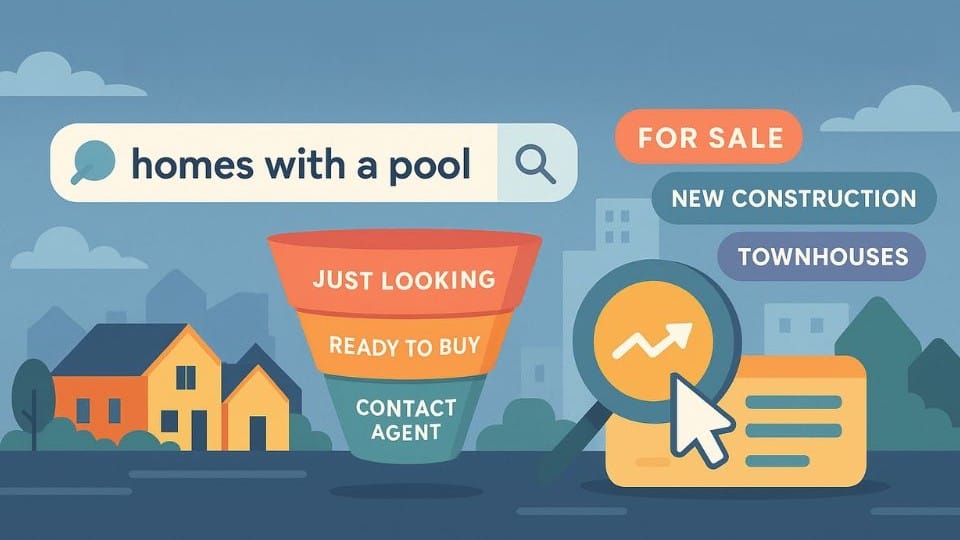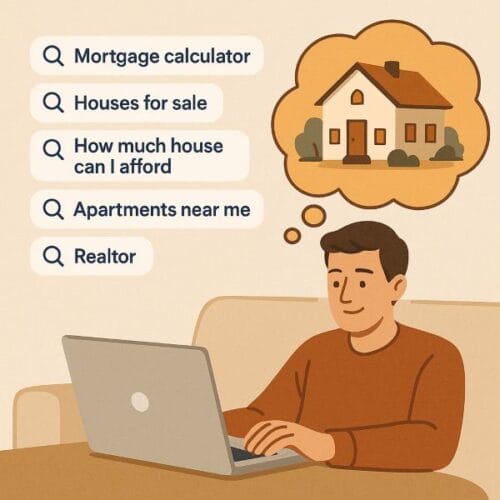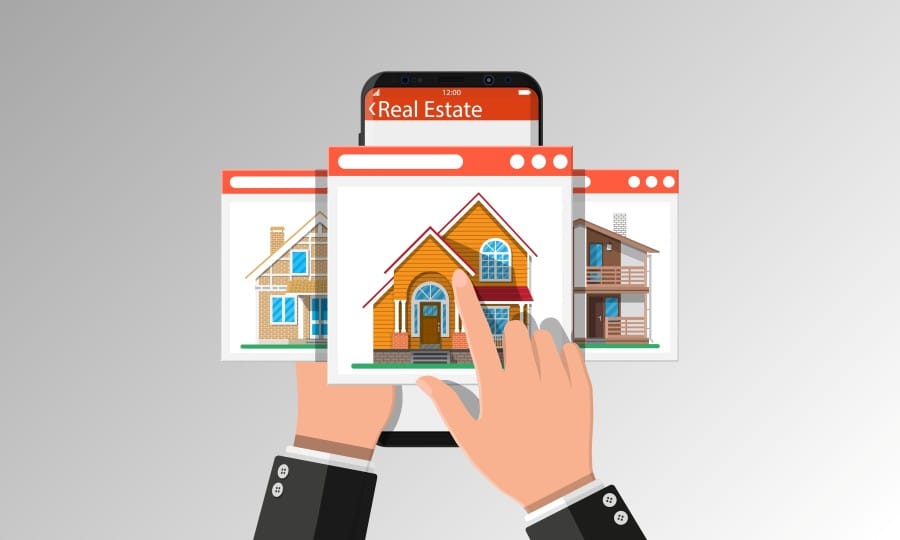
Most blog posts about real estate keywords give you a big list and call it a day.
But there’s a problem with that: not all keywords mean the same thing.
The phrase someone types into Google can tell you a lot about where they are in the homebuying process.
Someone searching “homes for sale near me” might just be browsing.
Someone else searching “3-bedroom homes with fenced yard in Alpharetta under 500k”?
That buyer is deep in the process. They’ve got a budget, maybe even a lender, and they’re ready to move.
That’s called keyword intent, and understanding it is the key to getting in front of serious buyers, not just random traffic.
What is keyword intent?
When someone enters a query into Google, they are signaling intent.
That’s the real reason SEO works so well for real estate, because it lets you match your content to the buyer’s mindset.
There are four main types of keyword intent:
-
Informational: They’re learning.
Example: “What is mortgage pre-approval?” -
Navigational: They’re looking for a specific site.
Example: “Zillow login” -
Commercial: They’re comparing options.
Example: “Best suburbs in Atlanta for families” -
Transactional: They’re ready to act.
Example: “Schedule a home tour in Roswell”
For now, we’ll focus on the three that matter most in real estate: informational, commercial, and transactional.
Stage 1: Early Interest

These are the “just browsing” buyers.
At this stage, people are starting to think about buying, but they’re not in a rush.
They might be six months out, or just trying to understand if buying a home is even realistic. Their searches tend to be broad, open-ended, and focused on big-picture questions.
They’re not ready to contact an agent yet. But if your content shows up here, you’ve got a shot at earning trust early and becoming their go-to later.
Top real estate keywords at this stage
(Ordered by monthly search volume)
“Mortgage calculator” – 3,350,000 monthly searches
“Realtor” – 2,240,000 monthly searches
“Real estate” – 1,700,000 monthly searches
“Apartments near me” – 1,500,000 monthly searches
“Houses for sale” – 498,000 monthly searches
“Houses for sale near me” – 405,000 monthly searches
“Homes for sale near me” – 301,000 monthly searches
“Homes for sale” – 244,000 monthly searches
- “How much house can I afford” – 201,000 monthly searches
“Land for sale near me” – 137,000 monthly searches
“Commercial real estate” – 131,000 monthly searches
“Property for sale” – 126,000 monthly searches
“Real estate agent” – 102,000 monthly searches
“Mobile homes for sale” – 81,000 monthly searches
“Commercial property for sale” – 59,000 monthly searches
“Real estate license” – 55,000 monthly searches
“Condos for sale near me” – 35,000 monthly searches
“How to become a real estate agent” – 32,000 monthly searches
“How to buy a house” – 32,000 monthly searches
“Property for sale near me” – 32,000 monthly searches
“Real estate housing market” – 31,000 monthly searches
“Real estate broker” – 29,000 monthly searches
“Commercial property” – 28,000 monthly searches
“Farms for sale” – 28,000 monthly searches
“Real estate business” – 24,000 monthly searches
“Apartments for sale” – 23,000 monthly searches
“Realtors near me” – 22,000 monthly searches
“Real estate near me” – 22,000 monthly searches
“Real estate agency” – 20,000 monthly searches
“Real property management” – 18,000 monthly searches
“Luxury real estate” – 17,000 monthly searches
“New homes near me” – 17,000 monthly searches
“Real estate agents near me” – 17,000 monthly searches
“Real estate agents” – 17,000 monthly searches
“Realtor near me” – 16,000 monthly searches
“American homes for rent” – 16,000 monthly searches
“Townhomes for sale near me” – 15,000 monthly searches
“Rental properties near me” – 15,000 monthly searches
“Estate agents near me” – 15,000 monthly searches
“Multi family homes for sale” – 15,000 monthly searches
“Commercial real estate for sale” – 13,000 monthly searches
“Real estate companies” – 13,000 monthly searches
“Real estate listings” – 12,000 monthly searches
“Real estate market trends” – 12,000 monthly searches
“Cheap houses for sale” – 8,100 monthly searches
“Beach houses for sale” – 8,100 monthly searches
“Foreclosed homes for sale” – 8,100 monthly searches
“Tiny houses for sale” – 14,800 monthly searches
“Zillow houses for sale” – 14,800 monthly searches
“Best mortgage lenders” – 18,100 monthly searches
What this tells you about the buyer
These searchers likely aren’t ready to tour homes yet.
They’re still figuring out the basics. They’re Googling what it takes to buy a home, how much money they’ll need for a down payment, and whether it’s even the right time to do so.
Most haven’t nailed down a location, a price range, or a timeline. But they’re thinking about it.
And that’s your cue to get on their radar early.
How agents can rank for these keywords
Write helpful, no-fluff blog posts that answer the exact questions buyers are asking—like “How to Buy a House in Georgia” or “What Every First-Time Buyer Needs to Know About Credit.”
Create simple mortgage explainers that break down rate changes, affordability, and what buyers can expect during pre-approval.
Highlight your local knowledge with guides to the best neighborhoods, cost of living breakdowns, and posts comparing suburbs in your market.
Use SEO to your advantage by naturally working these high-volume keywords into your content, especially page titles, meta descriptions, and H1s.
Meeting buyers where they are before they’ve made up their minds is how you build trust that lasts. If they find your site early, and it answers what they’re already searching, you’ve got a real chance at being the agent they remember when it’s go-time.
Stage 2: Research & Comparison

At this point, buyers have moved past the “maybe someday” stage.
They’re actively comparing areas, looking at price trends, and narrowing down the type of home they want. They’re not only Googling how to buy a house, they’re Googling where, when, and what kind.
This is where intent picks up.
They may not be ready to tour just yet, but they’re gathering the details that will get them there fast.
Top keywords for buyers in this stage
(Ranked by average monthly search volume)
“best places to live in [city]”
“first-time homebuyer programs [state]”
“school ratings in [county]”
“cost of living in [city]”
“average home prices in [city]”
“safest neighborhoods in [city]”
“walkable neighborhoods in [city]”
“[neighborhood] vs [neighborhood]”
“best suburbs of [city] for families”
“crime rate in [neighborhood]”
“[city] real estate market forecast”
“best areas in [city] for young professionals”
“homes near top-rated schools [location]”
“property tax rates in [county]”
“public transportation in [city]”
“best neighborhoods for first-time buyers [city]”
“real estate trends in [city]”
“most affordable neighborhoods in [city]”
“how competitive is the housing market in [city]”
“[city] vs [city] cost of living”
“up-and-coming neighborhoods in [city]”
“best places to retire in [state]”
“best school districts in [state]”
“homes near downtown [city]”
“pros and cons of living in [city]”
“family-friendly neighborhoods in [city]”
“average closing costs in [state]”
“how much do homes cost in [city]”
“living in [neighborhood] reviews”
“is [city] a good place to live”
“best areas in [city] for investors”
“homes with land in [region]”
“best zip codes to buy a house in [city]”
“[neighborhood] housing market”
“walk score of [neighborhood]”
“new developments in [city]”
“homes near BeltLine / greenway / transit”
“school zoning map for [district or county]”
“pet-friendly neighborhoods in [city]”
“[city] neighborhood guide”
“average rent vs mortgage in [city]”
“best neighborhoods in [city] with parks”
“buying a home in [school district name]”
“where to live in [city] for short commute”
“real estate market update [month/year] [city]”
“best real estate investments in [city]”
“community amenities in [neighborhood]”
“homes near top employers in [city]”
“luxury neighborhoods in [city]”
“homebuyer grants or assistance in [city/state]”
These keywords reflect high buyer intent and deeper engagement.
The more helpful and specific your content is at this stage, the more likely you are to win a buyer’s trust before they ever step foot in a showing.
What this tells you about the buyer
They’ve done the surface-level research. Now they’re weighing options.
They’re likely comparing neighborhoods, thinking about school zones, commute times, and value for money. They’re looking for clarity before committing to a shortlist, and they’re closer to reaching out than most agents realize.
How agents can rank for these keywords
Build comparison content: Posts like “Roswell vs. Alpharetta: Which Is Better for Families?” or “The 5 Best Suburbs of Atlanta for Remote Workers” rank well and help buyers make decisions.
Create school and lifestyle-based neighborhood guides: Include walkability, parks, schools, and commute insights, not just listings.
Write market trend content: Short, local updates on home prices or time-on-market in your area help you show up for long-tail “market forecast” queries.
Use local keywords across landing pages: For each neighborhood you serve, make sure the page title, H1, and meta description reflect what people are searching. Terms like “homes near top schools in Brookhaven” or “best neighborhoods in East Cobb under 700k.”
Stage 3: Ready to Buy / High Intent
At this point, the buyer isn’t just thinking, they’re acting.
They’ve done their research, picked a location (or a few), nailed down their budget, and are now searching for homes, agents, and next steps.
The search terms at this stage are laser-focused and usually tied to listings, features, or agent contact.
These are the buyers who are ready to click “Schedule a Tour.”
High-intent real estate keywords to target:
“3 bedroom homes for sale in [neighborhood]”
“homes for sale near [school name or landmark]”
“townhomes for sale in [city] under $400k”
“new construction homes in [city]”
“homes with basement in [neighborhood]”
“condos for sale near [university/downtown]”
“homes with pool in [city]”
“homes for sale in [zip code]”
“luxury homes in [neighborhood]”
“real estate agent in [neighborhood]”
“realtors near me”
“schedule home tour in [city]”
“homes with fenced yard in [neighborhood]”
“[neighborhood] open houses this weekend”
“[city] real estate listings”
“move-in ready homes in [city]”
“homes near [company HQ/employer]”
“top rated real estate agents in [city]”
“best buyer’s agents in [neighborhood]”
“houses for sale by owner in [city]”
“townhomes with garage in [area]”
“homes in [subdivision or development name]”
“4 bedroom homes under $500k in [suburb]”
“modern homes for sale in [city]”
“gated communities in [county or suburb]”
“homes on cul-de-sac in [neighborhood]”
“energy-efficient homes in [city]”
“homes near parks and trails in [city]”
“homes for sale near public transit [city]”
“price reduced homes in [area]”
“best home deals in [city] this week”
“homes with in-law suite in [neighborhood]”
“new townhome communities in [metro area]”
“[builder name] homes for sale in [city]”
“homes near lake or waterfront in [state]”
“historic homes for sale in [city]”
“ranch-style homes in [neighborhood]”
“homes with office or flex space in [city]”
“[city] homes near good daycare centers”
“investment properties in [zip code]”
“pet-friendly homes in [city]”
“starter homes in [city]”
“[price range] homes in [neighborhood]”
“real estate agent reviews [city]”
“best buyer incentives in [new development]”
“homes for quick closing in [market]”
“fixer-uppers in [neighborhood]”
“homes near top-rated high schools [area]”
“low HOA homes for sale in [city]”
“homes for sale with virtual tour in [city]”
What this tells you about the buyer
These searchers aren’t only serious, they’re nearly ready to move.
Their search queries are detailed, and many include a specific feature, price point, or neighborhood. They’re not looking for general advice anymore, they’re looking for homes to buy and agents to contact.
This is the closest you’ll get to a buyer raising their hand.
How agents can rank for these keywords
Create landing pages for specific property types
(e.g. “Homes with Pools in Milton Under 700k”) – Targeted pages rank faster and convert better.Write listing-level SEO descriptions
Instead of “Beautiful home in great neighborhood,” write “3 bed, 2.5 bath home in East Cobb with finished basement and fenced yard.”Update your Google Business Profile
Make sure your profile matches these high-intent searches. Include service areas, specialties, and keywords in your description.Add conversion points everywhere
CTAs like “Schedule a tour,” “Ask a question,” or “See similar homes” should appear on every page targeting these keywords.
At this stage, every click counts. If you can meet buyers with exactly what they’re searching for, and make it easy to take action, you’re winning business.
By integrating social media into your SEO strategy, you create multiple touchpoints for potential customers to discover and engage with your restaurant, ultimately driving more traffic and increasing your online visibility.
Keep SEO an ongoing effort
SEO isn’t a one-time job.
It requires regular updates and maintenance.
Monitor your rankings, keep your content fresh, and adjust your strategies based on what’s working.
A well-optimized restaurant website means more visibility, more bookings, and more satisfied customers. Start with the basics (like your Google Business Profile), stay consistent, and you’ll see the results in both search rankings and foot traffic.
Let’s grow your traffic together
Have an SEO question or need help with a project? Whether you’re a small business or a national brand, I’ll help you rank higher and convert more.
